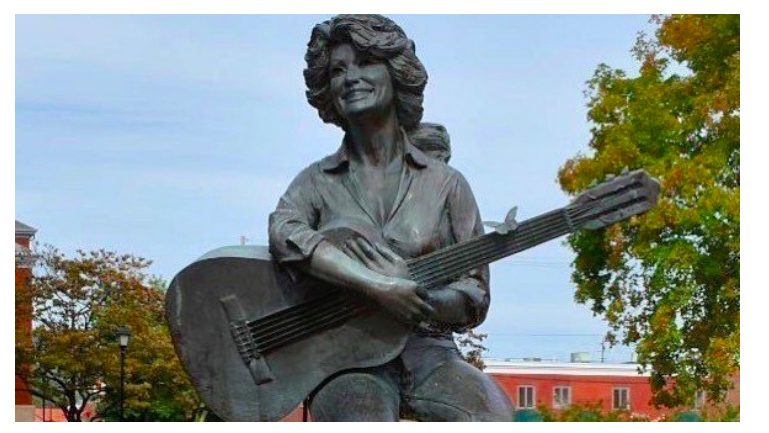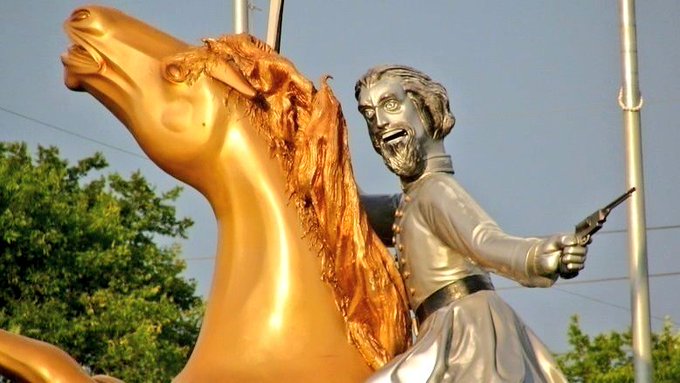
Change.org A Dolly Parton statue in Sevierville, Tennessee.
An online petition has been launched to replace a statute of a former Klu Klux Klan leader in Nashville, Tennessee, with a statue of Tennessee native and country music singer Dolly Parton.
Nathan Bedford Forrest was a general in the Confederate army during the American Civil War, and the first grand wizard of the Klu Klux Klan, founded in 1865 with the primary goal of re-establishing white supremacy.
A Change.org petition calls for Parton statutes to replace “all Confederate statutes in Tennessee.” It was launched on June 11 by Alex Parsons and quickly gained nearly 13,000 signatures.
The petition reads:
Tennessee is littered with statues memorializing Confederate officers. History should not be forgotten, but we need not glamorize those who do not deserve our praise. Instead, let us honor a true Tennessee hero, Dolly Parton.
Aside from her beautiful music, which has touched the hearts and lives of millions of Americans, Dolly Parton’s philanthropic heart has unquestionably changed the world for the better. From the Dollywood foundation that has provided books and scholarships to millions of American children, to the millions of dollars she has donated to dozens of organizations such as the Red Cross and COVID-19 research centers, Dolly Parton has given more to this country and this state than those confederate officers could ever have hoped to take away.
Let’s replace the statues of men who sought to tear this country apart with a monument to the woman who has worked her entire life to bring us closer together.
However, there are signs that the idea has a tough road ahead of it.
Here’s what you need to know:
A House Committee Vote Saw the Notion Fail
Forbes reported that “The Tennessee legislature has shown little interest in removing the controversial bust from the state capitol in Nashville, with a recent resolution calling for its removal failing by an 11-5 vote in a House Committee.”
Republican state Rep. Jeremy Faison suggested the idea in an interview with The Tennesseean last year that a statue of Parton could replace one of Nathan Bedford Forrest, installed in the state Capitol in 1978.
However, a local reporter says he wasn’t serious about it.
The conversation around the bust removal has been triggered again after worldwide protests over the death of George Floyd. The reporter who wrote the original Tennesseean article in December 2019, Natalie Allison, has taken to Twitter to clarify that the suggestion that Parton’s likeness should replace that of Bedford Forrest was made in jest:
On June 9, Tennessee State Rep. London Lamar successfully “Passed her bill through committee to remove Nathan Bedford Forrest Day as a day of special observance.”
Celebrities Including Taylor Swift Took to Social Media to Denounce Confederate Statues
Taylor Swift spoke about the Nathan Bedford Forrest statue on Twitter on June 12, calling Forrest “A brutal slave trader … who, during the Civil War, massacred dozens of black Union soldiers in Memphis.”
Swift, who was born in West Reading, Pennsylvania, but moved to Hendersonville, Tennessee with her family at age 13, called former U.S. Senator Edward Carmack and Nathan Bedford Forrest “Despicable figures in our state history.”
In another tweet, Swift said, “We need to retroactively change the status of people who perpetuated hideous patterns of racism from ‘heroes’ to ‘villains.’ And villains don’t deserve statues.”
A protester was shot at a protest surrounding a statue of Spanish conquistador Don Juan de Oñate on June 15, prompting the mayor Tim Keller to announce his intentions to remove the statue altogether.
A statue of Confederate President Jefferson Davis was torn down earlier this month in Richmond, Virginia, while in Portsmouth, Virginia, a man was placed in a medically induced coma last week after the head of a Confederate statue that was being taken down fell on him.
READ NEXT: LGBT Activist Death by Suicide in Canada


